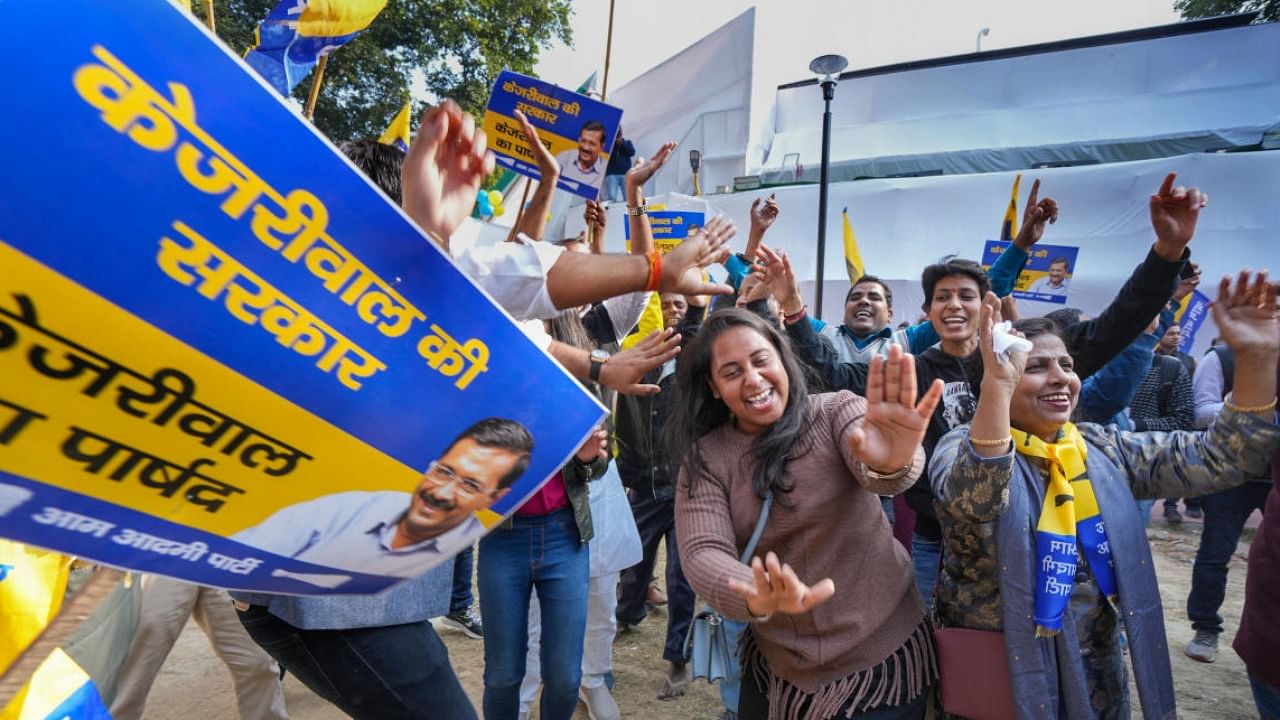
The Bharatiya Janata Party (BJP) threw the kitchen sink at the Aam Aadmi Party (AAP) in Delhi but lost. The win, therefore, would add to Arvind Kejriwal's appeal. It would help the AAP to convince people outside of Delhi and Punjab that in 2024 Kejriwal would be the challenger to Narendra Modi, the man he lost a Lok Sabha election to in 2014.
It gnaws at the AAP leadership that it is called the BJP's "B team", which only defeats the Congress. On Wednesday, at the victory celebrations, Delhi minister Gopal Rai declared that the MCD win was proof that the AAP also defeated the BJP.
Here is why this is important for AAP.
In 2014, the BJP, on the back of Modi's 'achhe din' promise, got 46.4 per cent votes, the AAP bagged 32.9 per cent and Congres 15.1 per cent on Delhi's seven Lok Sabha seats. However, in the 2019 Lok Sabha, despite having ruled Delhi for four years, the AAP's vote share dropped below that of the Congress. In 2019, the BJP got 56.9 per cent in Delhi, Congress 22.6 per cent and the AAP 18.2 per cent. The Delhi voters found AAP and Kejriwal fit enough to rule the Delhi Secretariat but not Raisina Hill.
But here is the bad news for the AAP.
The Muslims of Delhi, nearly 13 per cent of its population (2011 Census), seem to be losing their faith in the AAP. The minorities, Muslims and Sikhs (4.43 per cent of Delhi), largely supported the AAP in the 2015 and 2020 Delhi Assembly polls.
In 2015, the AAP vote share was 54.3 per cent, Kiran Bedi-led BJP's 32.3 per cent and Congress's 9.7 per cent.
Five years hence, in the 2020 assembly polls, the AAP's vote share was 53.57 per cent, while the BJP, then led by Manoj Tiwari in Delhi, increased to 38.51 per cent, and Congress's dropped to 4.3 per cent.
Despite the AAP's taciturn support of the anti-CAA agitation in Delhi, Muslims supported the party in the polls. But the AAP disappointed them when it failed to take a clear stand on providing relief to the victims of the riots in North East Delhi, and its recent Hindutva turn has not gone unnoticed.
The MCD elections polling percentage should ring the alarm bells for the AAP. The BJP has further closed the gap between itself and AAP, and the Congress increasing its vote share. But that is only because the AAP vote share has dropped rather than BJP's increasing.
The AAP's vote share is 42.5 per cent (a drop of 11 per cent from 2020), while the BJP's is 39.03 per cent and Congress's is 11.68 per cent.
The AAP candidates were runners-up in several Muslim-dominated seats, which the Congress won, particularly areas such as Mustafabad in Northeast Delhi district, which was worst affected in the 2020 riots, where the runner-up is Asaduddin Owaisi-led AIMIM's candidate.
The Congress has won wards in Delhi's predominantly Muslim dominated areas of Shastri Park, Seelampur, Chauhan Banger, Kabir Nagar and Brij Puri. The Congress has also won the Zakir Nagar and Abu Fazl Enclave wards, which were at the centre of the anti-CAA agitation. This, however, couldn't be good news for the Congress either.
The other troublesome fact is the AAP losing across East Delhi and North East Delhi districts, which are home primarily to migrants from eastern UP and Bihar. The AAP's strength in the 2013 and 2015 Assembly polls was the enormous support it received from Delhi's migrants, especially auto-rickshaw drivers. The BJP's projecting of Bhojpuri actor and singer and Lok Sabha MP Manoj Tiwari is working.
But to the BJP's abiding regret, it is increasing its vote share in Delhi at a snail's pace. Somehow, its vote share in the Lok Sabha polls in Delhi does not translate into a similar vote share in the Assembly and civic polls. After plateauing at 32 per cent in the assembly polls from 1998 to 2015, the BJP's vote share increased to 38.51 per cent in 2020 and has risen fractionally to 39.09 per cent in the civic polls.